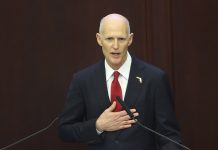TALLAHASSEE, Fla. (AP)– Behind schedule and late in the evening, House and Senate negotiators agreed Thursday to an $83 billion spending plan for the year that begins July 1, setting up a delayed end to the legislative session.
The agreement provides for a modest increase in the main state formula for funding public education, cuts payments to hospitals by more than $500 million, and provides a raise to state employees for the first time since 2013.
It also closes out an arduous, weeks-long negotiation between the two chambers that has already pushed them into overtime — a final vote on the spending plan will come Monday, three days after the annual legislative session was supposed to end.
The state Constitution requires a 72-hour “cooling off” period before any agreement between the House and Senate can be approved.
“The budget is closed. … No more. No more. The budget is closed,” said Senate Appropriations Chairman Jack Latvala, R-Clearwater.
The final piece of the massive puzzle fell into place Thursday night, when lawmakers agreed on how to divide $521.1 million in Medicaid cuts to hospitals. An earlier draft of the spending cuts had proved unacceptable to the Senate.
The second draft of the cuts rejiggered the final reductions for many hospitals. The largest beneficiary appeared to be Orlando Health, which received $1 million more under the second House proposal than under the first. Meanwhile, the cut for Florida Hospital in Orange County grew by $2.6 million, while the reduction for Baptist Hospital of Miami increased by almost $1.2 million.
Along with the hospital agreement, the chambers closed out a slew of other spending issues Thursday.
The two sides formalized an agreement on pay increases. Most state employees who earn $40,000 or less will get a $1,400 salary increase; those making more will get an extra $1,000 a year. Law enforcement and some high-ranking state officials, like Supreme Court justices, will receive more.
There are still some budget-related bills to hammer out, though those do not face the same 72-hour “cooling off” period as the main spending plan. The most contentious of those deal with education proposals from the House meant to encourage charter schools to set up near academically struggling traditional public schools and an expansion of the state’s “Best and Brightest” teacher bonus program.
Those bills seem to buck a trend in recent legislative sessions of keeping policy decisions out of so-called “conforming bills,” which are tied to the budget and are essentially must-pass legislation. Using those bills for significant changes led to a meltdown in the 2011 session.
Latvala, one of the senators who rebelled six years ago, made it clear Thursday he was not pleased with the change.
“Is that my preference to do that? No,” he said. “It’s not my preference to do that. But I’m a member of the Senate, and we have to try to accommodate the wishes of the rest of the Senate sometimes.”
With lawmakers facing heightened questions about the transparency of the budget process this year, particularly after House Speaker Richard Corcoran’s pledge to clean up the way the House operates, lawmakers said there would be a public hearing on whatever emerges on education.
House Appropriations Chairman Carlos Trujillo, R-Miami, suggested that hearing could come Friday, or perhaps Monday.
“We want to give the public ample opportunity to review them,” Trujillo said. “We’re not going to drop them, you know, 30 minutes before the meeting.”
And there remain questions about whether Gov. Rick Scott might veto the budget, as he has begun to hint he might do. Many of Scott’s priorities, including spending on economic development and an increase for tourism marketing, were discarded by the House-Senate agreement.
Senate President Joe Negron, R-Stuart, refused to answer directly Wednesday when asked whether he believed Scott would nix the entire spending plan, a rare move. Trujillo was also somewhat evasive when asked about the possibility Thursday.
“I would say it would be very difficult to veto the entire budget,” he said.














